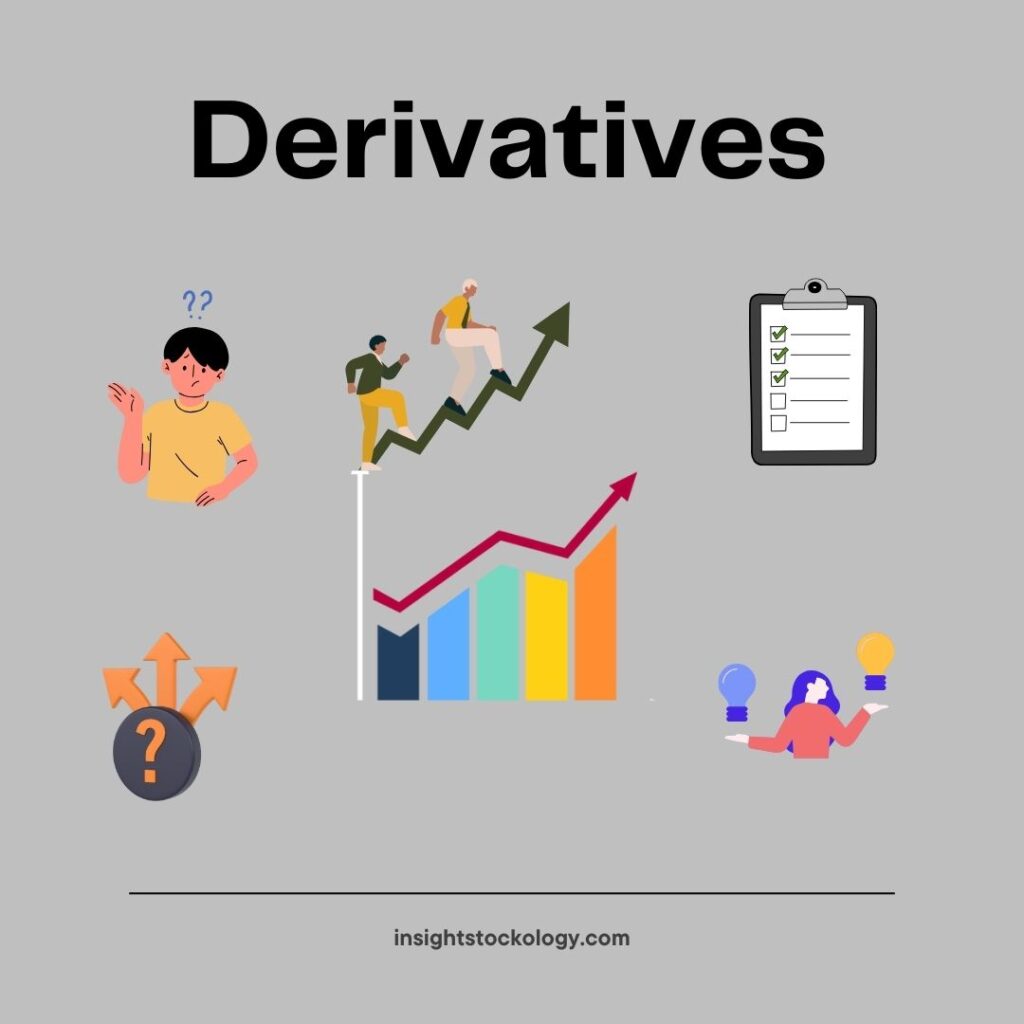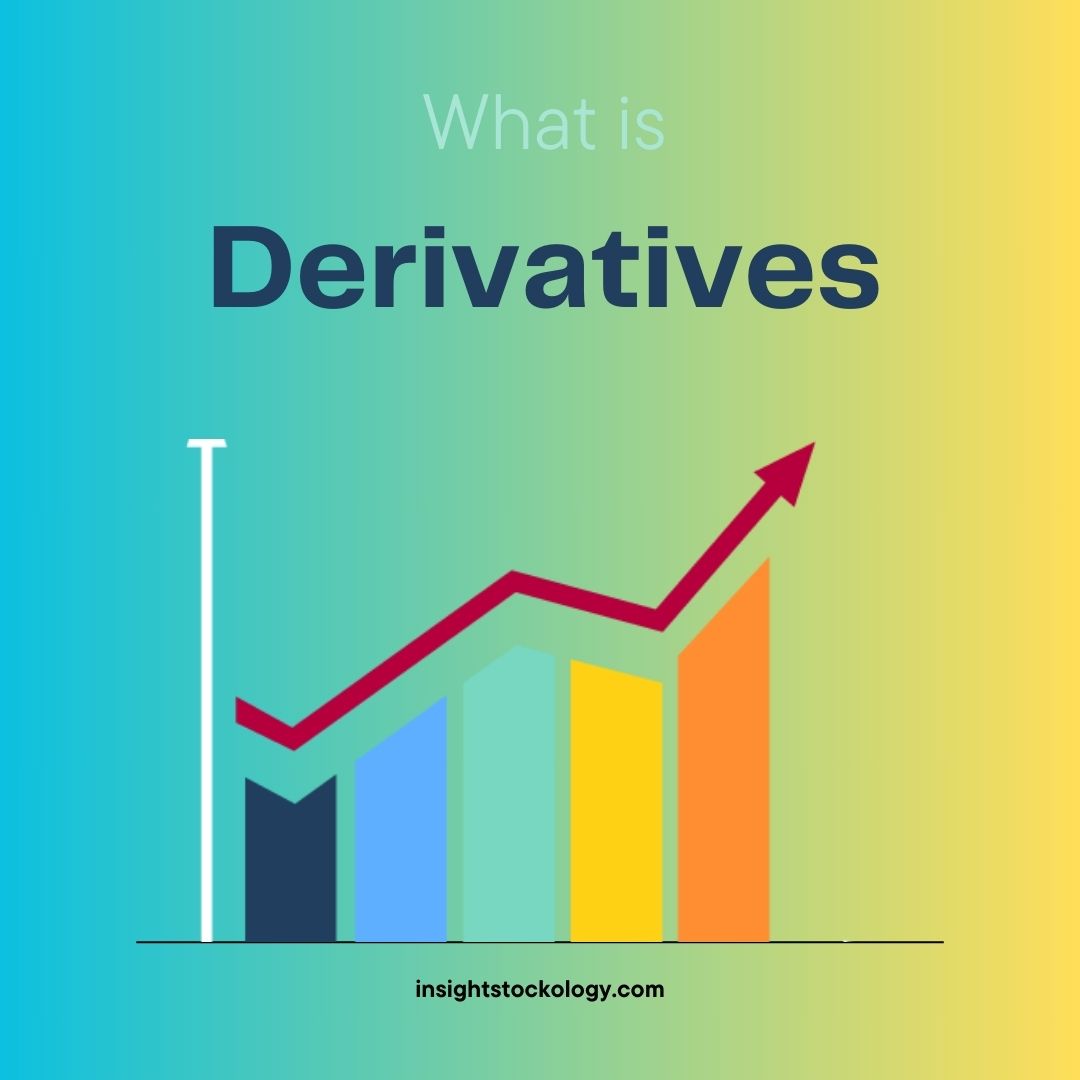Derivatives are financial contracts tied to an underlying asset, serving purposes such as hedging, risk hedging and portfolio enhancement. This article provides a comprehensive understanding of derivatives, cover types, participants, trading methods and their advantages and disadvantages.
In India’s financial market system, there are two main segments: the cash segment and the derivative segment. While the cash segment has traditionally been popular among investors, the derivatives segment has seen a phenomenal and rapid growth in turnover and trading volume. This growth, even surpassing the cash segment, highlights derivatives as a profitable investment option In order to successfully invest in derivatives, an important step is to gain a detailed understanding of how derivatives work.
In this blog post we are gonna discuss all about “What Is Derivative In Share Market- For Beginners 2024“
IMPORTENT HIGHLIGHTS
- A derivative is a financial contract based on the value of an underlying asset, group of assets or a set benchmark determined by multiple parties in share market.
- These contracts can be traded on an exchange or directly between the parties. The price of the derivative is affected by changes in the price of the underlying asset.
- Derivatives act as tools to magnify both risk and potential reward because they often borrow money.
Contents
What Is Derivative In Share Market
Derivatives are financial contracts tied to assets such as stocks, bonds, currencies or commodities. Their value depends on changes in the market conditions of the underlying assets. Investors use derivatives to predict and profit from future asset prices. For example, if a stock’s price is uncertain, entering into a derivative contract can help secure profits by accurately predicting its movements.
Picture this: If you believe that a stock’s price is likely to change (up or down), entering into a derivative contract allows you to bet on that change. It is either a smart move to earn more or protect yourself from potential losses in the real market where assets are traded.
Derivatives also act as a safety net, protecting against losses in the real market. These contracts can be traded on an exchange or over-the-counter and serve purposes such as mitigating risk (hedging) or taking risk for potential reward (speculation). In short, derivatives enable investors to navigate and capitalize on the dynamic nature of financial markets.

Types Of Derivatives Market
There are 4 types of derivatives contract exist in share market.
Forwards:-
A forward contract is a personalized agreement between two parties to buy or sell an asset at a set price in the future. Unlike standardized futures contracts traded on exchanges, forwards are negotiated over-the-counter (OTC), allowing for customization in terms of size and settlement. These contracts are mainly used for hedging to reduce risk, yet they do not guarantee profits. The OTC nature exposes them to counterparty risk, a type of credit risk where one party may fail to meet its obligations due to insolvency, leaving the other without recourse. It is important to note that counterparty risk increases as more traders are involved in the same contract.
Futures:-
Futures are financial contracts traded on share market, similar to forwards but standardized. Both parties involved are bound to fulfill the contract. These contracts are generally used for commodity speculation, and the main difference from forwards lies in their exchange on regulated platforms, ensuring standardization and oversight.
Options:-
Option contracts are contracts that give the buyer the right (but not the obligation) to buy or sell an underlying asset at a specified price within a specified time period. The buyer may choose to exercise this right, and the seller (the option writer) is obligated to fulfill the contract. If the buyer decides not to proceed, they can simply pay the premium to the option writer and avoid exercising the option. Options provide flexibility for risk management and can be used for hedging or speculation.
Swaps:-
Swaps are financial contracts in which two parties exchange their commitments to cash flows, often involving interest rates. These are private arrangements, not barter. Common types include currency swaps and interest rate swaps. For example, a company with a variable-interest loan can use a swap to switch to a fixed-interest loan or vice versa. In a simplified scenario, if a company borrows at a variable rate, it can pay with another company that has a fixed rate loan.
It helps manage the risks associated with interest rate fluctuations. Swaps can also address currency exchange rate or default risk. The 2008 credit crisis was partly linked to the risk of swaps like mortgage bonds. Overall, swaps provide a way to customize financial obligations between parties, providing flexibility and risk management in different financial situations.
What types of participants are involved in the derivatives market?
There are 4 types of participants are involved in the derivatives share market:-
Hedges:
Hedgers are individuals or businesses who want to protect themselves from the uncertainty of price movements in the market. For example, a person owning 200 shares of a company may be concerned about future price declines but not want to sell immediately. To manage this risk, they can use a financial tool called ‘options’ in share market. This allows them to set a minimum selling price for their shares, ensuring that they will not suffer significant losses even if the market price falls. Hedgers essentially transfer their risk to others in the derivatives in share market, reducing their exposure to potential losses.
Speculator:
Speculators, such as individual traders, hedge funds and financial institutions, aim to profit from price changes in the derivatives market without actually investing in the underlying asset. They take positions based on their predictions of future price movements. In financial markets, risk and return are interrelated, with higher risk potentially leading to greater return.
Hedgers, who want to protect against potential losses, are different from speculators, who actively seek risk for opportunities to make a profit. For example, a speculator in the derivatives in share market may agree to buy shares at a fixed price from someone who fears a price drop, providing relief in exchange for a small fee. It demonstrates how speculators find opportunities in derivatives markets as opposed to risk-averse hedgers.
Arbitrageurs:
Participants such as speculators, margin traders and arbitrageurs play an important role in capital markets. They increase liquidity by taking both long (buy) and short (sell) positions, contributing to overall market efficiency. Arbitrageurs specifically focus on exploiting price differences between related assets or markets. They aim to buy low and sell high, taking advantage of price inefficiencies. Their operations help maintain consistent prices across different markets, playing an important role in share market efficiency.
Margin Traders:
Traders in the derivatives market use a concept called margin trading. It involves depositing a minimum amount known as margin with the broker. Margin tracks daily profits and losses based on market fluctuations. With margin trading, traders can control large positions using leverage. For example, if you buy 100 shares of XYZ Ltd for ₹1 lakh in the cash of share market, in the derivatives market, the same amount allows you to own a large position.
In derivative trading, you don’t have to pay the full price upfront. Instead, you deposit a fraction known as margin, resulting in a higher leverage factor. Leverage allows you to maintain a large position with a small deposit. There is a limit to the leverage factor, usually allowing three to five times the amount your capital allows in the cash market. The conclusion of a trade in the derivatives share market is called ‘settlement’, where you either pay off the outstanding position or conduct a reverse trade to cancel it.
How to Trade in Derivative Share Market
To trade in the derivative stock market:
Open an online trading account: Before you start trading derivatives, you need to have an account with a brokerage firm that offers derivatives trading services. This usually involves signing up online, providing required documentation and funding your account.
Understand Margin Requirements: When trading derivatives, you may be required to deposit a certain amount of money known as margin. This margin acts as a security deposit and ensures that you have sufficient funds to cover possible losses. It is essential to understand how margin works and the minimum margin requirements set by the brokerage.
Be aware of underlying assets: Derivatives derive their value from underlying assets such as stocks, commodities, currencies or indices. It is very important to stay informed about market conditions, news and events that can affect the price of this underlying asset. This knowledge helps you make informed trading decisions.
Manage your budget effectively: Trading derivatives involves financial risks including the possibility of losses. It is essential to manage your trading budget effectively and invest only what you can afford to lose. Consider factors such as your risk tolerance, financial goals and investment strategy when determining your trading budget.
Hold investment until the trade is completed: Derivative contracts have expiry dates and it is essential to hold your investment until the trade is completed or the contract expires. Exiting a trade prematurely can result in missed opportunities or losses. Make sure to monitor your positions regularly and have a clear exit strategy.
By following these steps and being disciplined in your trading in derivative share market approach, you can effectively participate in the derivative stock market. Be sure to continue learning and adapting to market changes to improve your trading skills over time.
Advantage & Disadvantage of Derivatives Stock Market

#Advantage Of Derivative Stock Market:
Derivatives offer a cost-effective way to manage risks in financial markets. With lower costs than shares or debentures, they act as a risk mitigation tool. By spreading risk among participants, derivatives help reduce overall risk in the market. Additionally, these financial instruments allow for hedging positions in the cash market, ensuring that losses are minimized or even eliminated.
Furthermore, derivatives act as a way to lock in prices, hedge against adverse market movements, and reduce risk for businesses and investors. The use of borrowed funds (margin) makes derivatives a more affordable option for traders in share market.
#Disadvantage Of Derivative Stock Market:
Derivatives, which derive their value from other assets, pose challenges in valuation due to factors such as time to expiration, holding costs and interest rates. They have no intrinsic value and are sensitive to market sentiment and risk, causing their value and liquidity to fluctuate independently of the underlying assets. Additionally, being a leveraged instrument, derivatives can amplify both returns and losses.
The unpredictable nature of underlying asset values makes these instruments high-risk, especially when used for speculation, potentially leading to significant losses. Furthermore, standardized contracts in exchange-traded derivatives limit market flexibility and adaptability.
Here’s The Best Online Brokers:-
[ Do not influence by our recommendation. It’s entirely your responsibility to find the best broker ]
Conclusion
In conclusion, the share derivative share market presents inherent challenges in valuation and risk management. Due to their dependence on underlying asset prices and sensitivity to various factors such as timing, holding costs and interest rates, derivatives have no intrinsic value and are subject to share market sentiment.
The speculative nature of these instruments, often used for profit-seeking, adds a layer of unpredictability, which contributes to their high-risk profile and creates the potential for substantial losses. Additionally, the flexibility of standard contracts in exchange-traded derivatives limits adaptability to the market. Hence, navigating the derivative share market requires a thorough understanding of these complexities and careful risk assessment.









2 thoughts on “What Is Derivative In Share Market- For Beginners 2024”